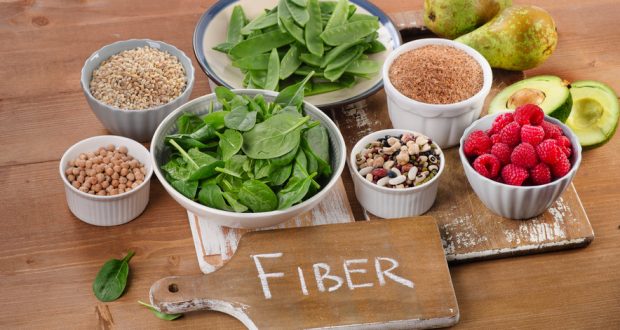If you are wondering what the connection is between fiber intake and heart health, read on! In this blog post, I hope to convince you that including sufficient amounts of fiber in your diet is not only important for a healthy gut but also for a healthy heart.
When someone has difficulty in passing stools, the common advice given is “eat bananas”. The reason is that banana contains soluble fiber which helps to regulate bowel movements and thereby addresses the problem of constipation.
So what is dietary fiber? It is a non-digestible form of carbohydrates present in plant based foods like fruits, whole grains and vegetables. It can neither be digested nor broken down like other foods.
There are two kinds of dietary fiber namely soluble and insoluble fiber.
- Soluble fibers are easily dissolved in water and change into a gummy gel like substance that is partially digested in the large intestine. Some examples of soluble fibers are legumes, lentils, brown rice, oats, barley, whole or cut fruits (with skin and pulp and not in juice form), potato, and dried beans. Apart from helping in blood pressure reduction, the low glycaemic index of high fiber foods helps to control blood sugar level.
- Insoluble fiber absorbs water, which adds bulk to the digestive tract and helps to regulate bowel movements. Whole grain products, cabbage, green beans, green leafy vegetables, nuts and whole bran are some foods rich in insoluble fibre. Fiber can have various beneficial effects on our body when taken in good quantities every day.

Evidence from medical research
Greater dietary fiber intake is associated with a lower risk of many cardiovascular diseases including coronary heart disease. Dietary fiber intake specifically from grains is inversely associated with total mortality rates, particularly cardiovascular, infectious, and respiratory deaths in both men and women (a National Institute of Health Survey done in USA has shown that dietary fiber intake actually lowered risk of death from cardiovascular, infectious, and respiratory diseases by 24%–56% in men and 34%–59% in women).
In fact, constipation can be a serious threat to heart health as it increases the strain on the heart and can lead to sudden death in individuals with heart ailments. So consuming adequate fiber in your diet not only prevents heart problems but also helps avoid some dreaded complications in heart patients.
What other benefits does fiber provide?
* Fiber can soak up water in the stomach slowing the absorption and increasing the feeling of fullness
* It can cause weight loss by reducing your intake of high calorie foods
* Fiber can promote the growth of good bacteria in your gut, thereby establishing a healthy gut microbiome
* Consuming adequate amounts of fibre prevents gastrointestinal disease, piles and haemorrhoids
* Fiber is known to protect against colon cancer
How much fiber should I eat?
The Indian Dietetic Association recommends that adult men and women should consume about 25-35 grams of fiber per day, with 10-15 grams from soluble fiber. This can be accomplished by choosing 6 servings of grains (of which 3 are from whole grains), 3 servings of vegetables, and 2 servings of fruits.
Choose high fiber varieties of grain-based foods like whole-wheat chappathis, multigrain bread, millet dishes and unpolished rice like brown rice instead of refined grains like maida products, white rice and white bread. Include a variety of wholegrain, such as brown rice, oats, millets and barley and 2-3 servings of fruits and 3-4 servings of vegetables every day.
Can too much fiber be harmful?
High-fiber foods are good for your health. But too much fiber can produce excessive intestinal gas and abdominal bloating. My suggestion is that you increase fiber in your diet gradually over a period of time. This allows the natural bacteria in your digestive system to adjust to the change. Drinking adequate water will help you to avoid the gas, bloating, cramping and constipation that can occur when you increase your consumption of fruits, vegetables, legumes and whole grains suddenly. If you are advised to be on fluid restriction due to heart problems, you should consult your dietician to find out more about how much fiber is good for you.
I hope I have convinced you to incorporate fiber-rich foods into your daily life! It is really that simple. When you think of all the health benefits plus the added bonus that you may lose excess body weight and become fit, why shouldn’t you start focusing on fiber for a healthy you?